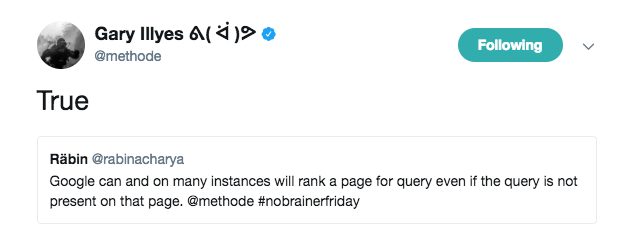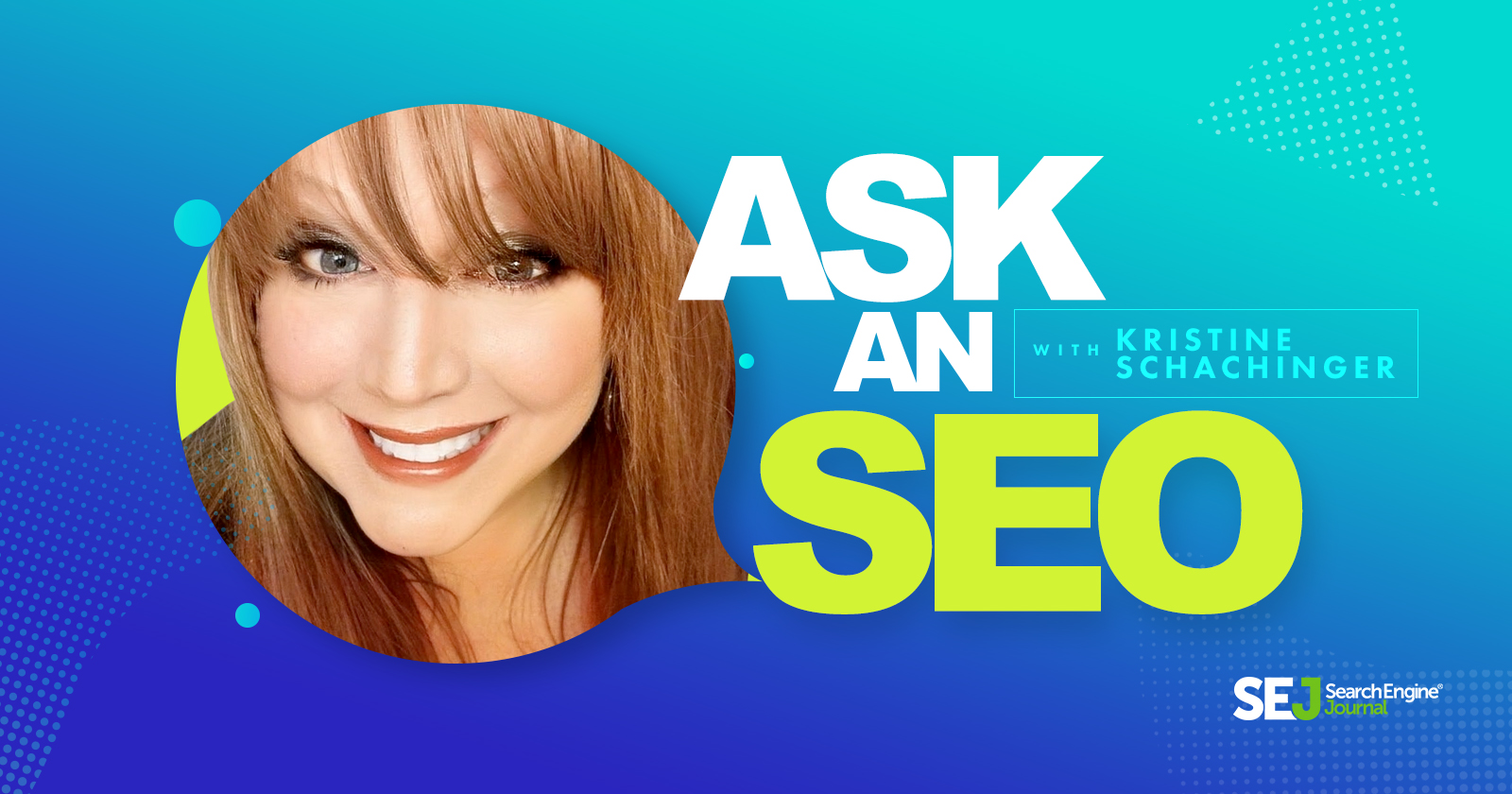Editor’s note: “Ask an SEO” is a weekly column by technical SEO experts Jenny Halasz and Kristine Schachinger. Come up with your hardest SEO question and fill out our form. You might see your answer in the next #AskanSEO post!
This week for “Ask An SEO”, we have a question from Amir in California:
“Can I increase the rank of a keyword without any link building?”
The short answer is yes. But you probably want a few more details than that.
First, let’s define what we mean by “rank of a keyword” or “keyword rank”. Personally, I prefer to use the terms “query” and “positioning”, though keywords and rank are subtexts for these two more comprehensive definitions.
The distinction is subtle, but important.
Rank infers that there is a position everyone sees and that position is absolute, which isn’t how Google works anymore.
Positioning refers to where a site is placed in the page relative to subtle modifiers Google uses like geolocation, presence of local items like a map pack, and user personalization. You can use rank when talking about a specific SERP, but it is a subset of the concept of positioning.
The term “query” is definitionally broader as well.
A keyword was a more accurate depiction before Google moved from “strings to things.” By using the term query we are looking at the keyword as part of a variation of terms surrounding that primary term, which also often takes the form of a question.
Whereas keyword is specific to exactly what you entered in the search box and without stop words (the, if, these etc.) or modifiers, query takes these into account.

In fact, Google will even return results for words that are not part of your query term, but are a close variant, so keyword is a bit too specific to be accurate.
Query is a better representation of how Google is working with language these days, though you will have keywords inside a query.

So What About Query Positioning? (Keyword Rank)
Do you have to have links?
We should be clear, a site needs links.
We are all probably aware that Google says you can rank without links and while that is not impossible, to maintain positioning in a moderately competitive query to a competitive one, you are going to need links.
How you acquire those links is a matter of what strategies or tactics you use, but links are a must.
However, the question is can you increase positioning without those links? And the answer is yes, yes you can, in many ways.
How Can You Increase Positioning Without Links?
A site has a set of internal ratings given by Google made up of hundreds (possibly rumored to be thousands) of ranking factors, so improvements across other signals (outside of links) can be very impactful on a site’s position.
So what specifically are some of the things you can work on to improve that value and therefore improve your positioning?
1. Site Crawl & Indexing Improvements
Ask yourself:
- Is Google able to crawl your pages well?
- Are there any spider traps or redirect loops?
- How are your canonicals working?
- Are you creating roadblocks that might chase Google off your site?
Use a tool like Screaming Frog and see how well your site is being crawled and make sure that you check it with the mobile user agent.
Even if you have not moved to mobile-first indexing yet, you will soon and it is important you know how your site is being crawled.
2. Schema
While schema is not a direct ranking factor it is part of how pages end up in certain featured snippets, so you will want to review schema and find the ones best for you and your site.
Google prefers you use the JSON-LD version. Keep in mind that nothing should appear in the content of the schema that differs from what is in the page. Google considers that cloaking and your site will likely receive a manual action.
3. Page Speed Improvements
Page speed is a ranking factor according to Google. While some factors we can only rely on experience to tell us it works, page speed is one Google has told us exists.
Now, they will say that it is merely a tiebreaker. This means when Google goes to retrieve documents to fill a search result request and all things are equal, the site with the better page speed will be the factor Google uses to decide which one will show up first.
What Google does not tell you is that, yes, it is merely a tiebreaker when your page speed signals are already good. But if you have a very slow site, fixing that issue can lead to increases over 100% or more when it comes to traffic.
What is it to “fix” this issue?
Google does not tell us specifically, but if you test your site with Google’s specifications (a 3G, Nexus 5+ user agent) and it is coming in over 10 seconds on the full page load and over 4-5 seconds on the DOM (Document Object Model – basically your HTML and dependencies) improvements of 50% or more in that speed can lead to highly significant improvements in positioning and traffic.
Check out how you fare in this area using Google’s PageSpeed Insights tool.
4. Content Relevancy & On-Page Optimization
Content relevancy starts with the title tag. If you want to be found for a query, the title tag is still one of the best places to add it.
Use your main terms in the query and keep important words to the left (for LTR languages, right for RTL languages).
While Google uses pixel width for determining how long that tag should be, if you keep the words under 60 characters with spaces you should fit the space allotted in the SERPs almost 100% of the time without triggering the dreaded “…”.
Next, you will want to make sure you have optimized the items on the page. These would be:
H1 tag
First Paragraph
It used to be that Google almost required multiple mentions of the keyword in the first paragraph to rank a site best (Known as TF-IDF), but now with their advances in language interpretation, this is not considered necessary.
However, it is still good to send a signal in the opening paragraph of what the content of the page will contain and this is not only for Google, but users.
Note these should NEVER be spammed. You can even get a manual action for doing so, but if you link an image that attribute is the same as if you had put straight anchor text in the link.
Also, with Google’s recent emphasis on image search you will want to make sure these are optimized for additional pick-up there.
Please remember though these tags are primarily for people with disabilities and you should follow the WCAG accessibility guidelines for proper implementation.
Captions Around the Image
Google is utilizing captions and context around images to help rank them better in image search, so you will want to make sure you have added these to the page when possible.
Content
This may seem like a no brainer, but it is surprising how often it gets overlooked. Make sure you actually mention the traffic-driving query term in the page.
We have had issues where a client did not use the query term, but only part of it, and then not show up at all for the full term for which they were wanting to see the site rank.
The issue is, Google is not as good at interpreting language intent as many think they are.
So if you are selling running shoes and you put up a page about running with pictures of shoes a human will understand the intent is to talk about running shoes, but Google will not, and you will not rank for the running shoes query.
As they say, “Talk to me like I am 5!” With Google, think more like a 6-month-old.
5. AMP
Accelerated Mobile Pages (AMP) by themselves won’t help with ranking, but they are required for certain page placements.
For example, if you want to be in the news carousel, aside from being in the Google News program, you have to have AMP pages or you cannot show up there. This is also true for AMP stories. So simply by using AMP, you can get into the top of page placements that were not open to you before.
Yes, You Can Increase Keyword Rank Without Any Link Building
These are not the only things you can do to increase your page visibility, but these are some of the more impactful changes you can make to your site to increase your positioning without creating links to those pages.
Put simply: yes you can rank a site better for specific terms without links though if the site is in a moderately competitive to competitive niche it won’t stay there long without them.
More Resources:
- How to Improve Your Keyword Rankings in Google
- 5 Proven Ways to Increase Your Google Rankings
- 10 Ways to Get Multiple Organic Page 1 Google Rankings
Image Credits
Featured Image: Paulo Bobita
Screenshot taken by author, August 2019




